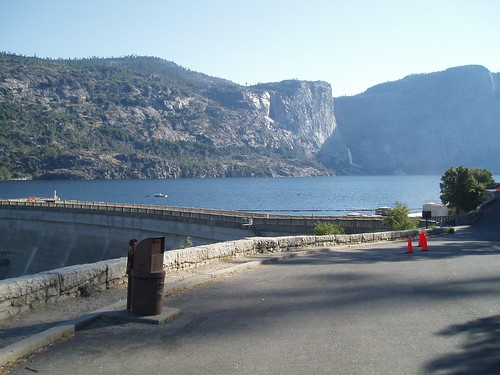Dam Hetch Hetchy! As well dam for water-tanks the people's cathedrals and churches, for no holier temple has ever been consecrated by the heart of man.Hetch Hetchy then...
-- John Muir

...and now:

I have mixed feelings about restoring Hetch Hetchy. On a purely emotional level, I would love to see it happen. Damming Hetch Hetchy was one of the great American crimes against nature, of the all-time greatest acts of vandalism, and I would love to believe that the damage could be undone. Ever since I first read about the valley's tragic history, I have fantasized about someday being able to see it as it was...so now, decades later, to see it discussed as a real possibility touches me in a deep, visceral way. What's more, restoring Hetch Hetchy Valley would have symbolic value far beyond the granite walls that enclose it. It would be a statement, a precedent, an acknowledgment of the damage we have done and a promise to make amends.
And yet...
I know it wouldn't be fully restored within my lifetime; I know there's some question about whether it could ever really be 'restored', or what that even means. Those aren't the problems for me, because finding the answers would have tremendous value in itself. The thing I have a hard time getting around is the price tag: somewhere between $1 billion and $10 billion.
Imagine if someone gave environmentalists a billion dollars--ten billion dollars, even--to spend on whatever they thought would do the most good. Framed that way, I don't think Hetch Hetchy would make the cut. Resources are finite (well-nigh non-existent, under this administration...but that's another story), and all expenditures force us to make choices. We could do a lot of real, lasting good for the environment with that kind of money, and I'm not sure restoring Hetch Hetchy is the most good we could do.
Then again, maybe the money wouldn't exist without the restoration. That is, maybe that kind of money could be raised for a high-profile, emotionally satisfying project like restoring Hetch Hetchy, but not for less sexy (but worthwhile) endeavors. In which case, why not?
And then, as I swing back to the pro side, I can't help thinking: how do we put a price tag on a place as unique as Hetch Hetchy? What is the dollar value of Yosemite, say, or the Grand Canyon, or Mount Rainier? How can we even ask the question?
So I don't know.
There's another objection that I find interesting but unpersuasive, raised in a very thoughtful post by Erik Loomis at Alterdestiny:
I think what concerns me more is that this effort reinforces the idea that national parks should be places without human history....Throughout the history of American national parks, narrative myths have developed of these places having no human history. Rather, they are seen as pristine pieces of nature unchanged by humans. This is almost always completely untrue. These myths began in the early 20th century when the Native Americans who routinely used Yellowstone and other national parks as hunting grounds were forced out by the Park Service, the US Army, and conservationists....National parks have human histories. These are important histories to tell.I think Erik's larger point is well-taken. In fairness to the Park Service, in the last 20 years or so the National Parks have been bringing that human history back to the foreground...but there remains an uneasy paradox at the heart of the National Park idea: to prevent further human intrusion is itself a distinctly human intervention, an intervention that seemingly denies its own status as intervention. I think this intervention is right and necessary, but it has to be done (and I think for the most part is done, today at least) without any illusions as to its paradoxical nature.
But when it comes to Hetch Hetchy and human history...well, there's a tremendous difference between (say) the Ahwahneechee using controlled burns to maintain an open oak forest, and damming Hetch Hetchy--between tailoring the landscape, if you will, and obliterating it. To class them together as part of the 'human history' of Yosemite is, I think, to elide a difference not just of magnitude but of essential nature.
And realistically, to un-dam Hetch Hetchy would not be simply obliterating the past; it couldn't possibly be that even if we wanted it to be. It would be, rather, another lesson in the human history of the area--an ongoing lesson, an experiment--and would have to be understood as such.
[That's all, folks]
|